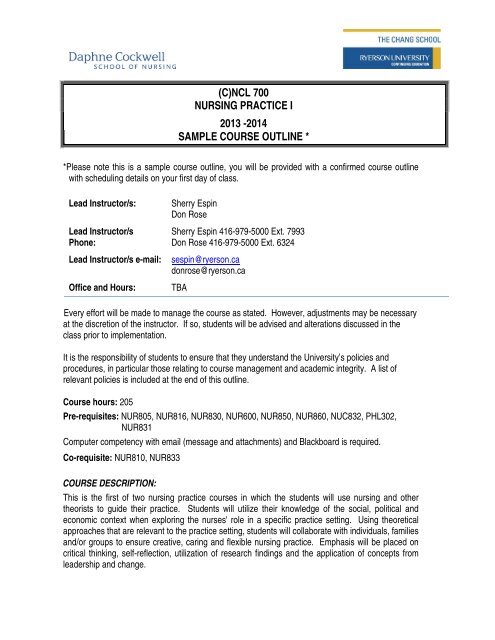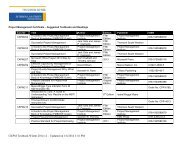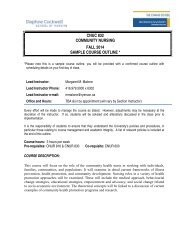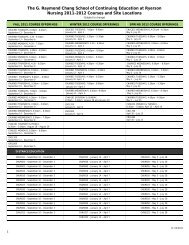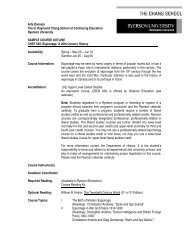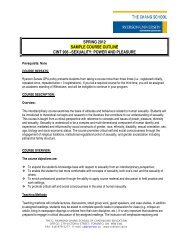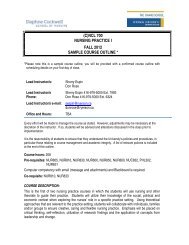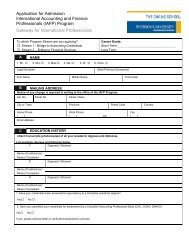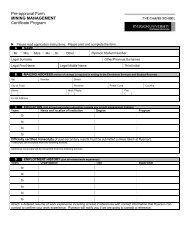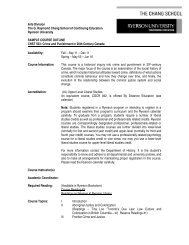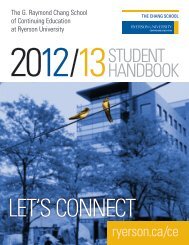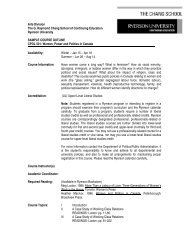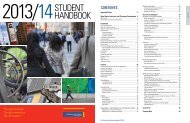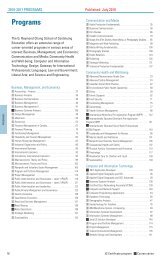Sample Classroom Course Outline - The Chang School - Ryerson ...
Sample Classroom Course Outline - The Chang School - Ryerson ...
Sample Classroom Course Outline - The Chang School - Ryerson ...
- No tags were found...
You also want an ePaper? Increase the reach of your titles
YUMPU automatically turns print PDFs into web optimized ePapers that Google loves.
(C)NCL 700NURSING PRACTICE I2013 -2014SAMPLE COURSE OUTLINE **Please note this is a sample course outline, you will be provided with a confirmed course outlinewith scheduling details on your first day of class.Lead Instructor/s:Lead Instructor/sPhone:Lead Instructor/s e-mail:Office and Hours:Sherry EspinDon RoseSherry Espin 416-979-5000 Ext. 7993Don Rose 416-979-5000 Ext. 6324sespin@ryerson.cadonrose@ryerson.caTBAEvery effort will be made to manage the course as stated. However, adjustments may be necessaryat the discretion of the instructor. If so, students will be advised and alterations discussed in theclass prior to implementation.It is the responsibility of students to ensure that they understand the University’s policies andprocedures, in particular those relating to course management and academic integrity. A list ofrelevant policies is included at the end of this outline.<strong>Course</strong> hours: 205Pre-requisites: NUR805, NUR816, NUR830, NUR600, NUR850, NUR860, NUC832, PHL302,NUR831Computer competency with email (message and attachments) and Blackboard is required.Co-requisite: NUR810, NUR833COURSE DESCRIPTION:This is the first of two nursing practice courses in which the students will use nursing and othertheorists to guide their practice. Students will utilize their knowledge of the social, political andeconomic context when exploring the nurses' role in a specific practice setting. Using theoreticalapproaches that are relevant to the practice setting, students will collaborate with individuals, familiesand/or groups to ensure creative, caring and flexible nursing practice. Emphasis will be placed oncritical thinking, self-reflection, utilization of research findings and the application of concepts fromleadership and change.
COURSE OBJECTIVE/LEARNING OUTCOMES:By the end of this course it is expected that the student:1. demonstrates caring as it relates to the self and others.2. determines meaning and significance in client encounters.3. establishes meaningful connections with clients to facilitate therapeutic interactions.4. collaborates with clients and colleagues to ensure consistent, safe, effective care.5. uses personal knowledge and theory from nursing and related disciplines to determine anappropriate course of nursing actions.6. uses reflective, critical and analytical thinking to facilitate creative and flexible nursingpractice.7. critically appraises research studies and utilizes the findings as a basis for nursingpractice.8. identifies gaps in nursing knowledge, considers research possibilities, and participates inresearch activities where appropriate.9. analyses health and practice issues within the social/economic/political environment.10. practices nursing in a skilful, therapeutic and culturally sensitive manner.11. provides leadership within his/her own practice to facilitate clients' and colleagues' desiredoutcomes.12. uses population health principles to plan, market, implement and evaluate healthpromotion and disease prevention programs.13. works within the context of a multidisciplinary health care team to apply primary health careprinciples.14. participates in developing and implementing strategies for the improvement of the healthenvironment through the use of the political process and the principles of social justice andequity.15. practices nursing within legal, ethical and professional guidelines.16. is an active participant in his/her personal and professional development.3 | Page
TEXTBOOK & READING LISTS:Required Readings and ResourcesAmerican Psychological Association (2010). Publication manual of the American PsychologicalAssociation (6 th ed.). Washington, DC: Author.Bastable, S.B. (2008). Nurse as educator: Principles of teaching and learning for nursingpractice. (3rd Ed.). Sudbury, MA: Jones and Bartlett.**Canadian Nurses Association. (2010) Canadian Registered Nurse Exam Prep Guide. Available toorder online at: http://bookstore.cna-aiic.ca/c267877p17556438.2.html (required only forthe post diploma bridging RPN students and internationally educated post diploma bridgingstudents)Post Diploma Degree Program Student Handbook. (2013-2014). Toronto, ON: Daphne Cockwell<strong>Ryerson</strong> University <strong>School</strong> of Nursing.Ziegler, S.M. (2005). <strong>The</strong>ory-directed nursing practice. (2 nd Ed.). New York, NY: SpringerPublishing Company, Inc.OTHER MATERIALS:Recommended Resources:**Marshall-Henty, J. Sams, C & Bradshaw, J. (2009). Mosby’s Comprehensive Review for theCanadian RN Exam. Mosby: Toronto, ON. (Recommended only for the post diplomabridging RPN students and internationally educated post diploma bridging students)METHOD OF INSTRUCTION:This course requires student interaction on the internet via Blackboard with weekly modularcontent. Individual and/or group meetings with a faculty advisor, either face-to-face or using theinternet, are utilized to guide learning experiences. Group discussions are planned to facilitatediscussion among students and are a compulsory component of nursing practice for all full timeand part time students. All course related discussion and expectations must use Blackboard andnot personal e-mail.4 | Page
METHOD AND SCHEDULE OF STUDENT EVALUATION:Methods of Evaluation:A final grade based on the course assignments is submitted for the nursing practice course by thefaculty advisor. Nursing practice assignments are graded according to the Guidelines for GradedWritten Assignments found in the Post Diploma Program Student Handbook. Nursing PracticePerformance Appraisals follow the College of Nurses of Ontario Standards of Nursing Practice. <strong>The</strong>student will receive feedback and grade for individual assignments and the official final grade in thecourse only from the Registrar.Each evaluation component comprises both scholarly writing and application to nursing practiceaimed at consolidating the program outcomes. Methods of evaluation build upon and integrateknowledge, concepts, and theory acquired throughout the program courses. Depth and breadth ofexpressed knowledge, along with the student’s ability to be both a critical and reflective thinker willbe evaluated using the student’s actual placement or workstudy experience. In this way thestudent’s practice experience is consistently being evaluated in each written assignment.Assignments are governed by the Academic Policies and Protocols stated in the Post DiplomaDegree Program Student Handbook (found under the nursing resources link in Blackboard) and theuniversity calendar.Academic integrity and plagiarism policies will be enforced. Students must refer to the PostDiploma Degree Program Student Handbook as well as the <strong>Ryerson</strong> University website forAcademic Integrity http://www.ryerson.ca/academicintegrityEvaluation: Online participation, assignments, tests, examinations, and papers.Scheduled Hours:Weeks 2 - 12 = 165 hours (15 hours/week practice/workstudy).Weeks 1 - 12 = 36 hours (3 hours/week participation - independent study/on-line/face to facediscussion)Weeks 1 and 13 = 4 hours (2 hours mandatory orientation and 2 hours mandatory final meeting).<strong>The</strong> total number of hours for the semester equates to 205 hours. <strong>The</strong>se consist of the following:Nursing Practice/Workstudy HoursWeeks 2 to 12: 165 hoursNursing Participation HoursWeeks 1 to 12: 36 hoursWeeks 1 and 13: 4 hours*NOTE: Students are not permitted to be absent (i.e. vacation during their nursing practice course).5 | Page
Assignments:1. Learning Plan2. Critical Reflective Analysis Paper3. Project Report4. Nursing Practice Performance AppraisalMISSED TERM WORK OR EXAMINATIONS:Students are expected to complete all assignments, tests, and exams within the identified timeframes and by the dates indicated in this outline and these dates/ times and the course syllabusthat will be provided day 1 of class. Consideration for a deferral of an assignment, term test, or finalexamination is only permitted for a medical or personal emergency or due to religious observance(request must be received within the first two weeks of the course). <strong>The</strong> instructor must be notifiedby e-mail prior to the due date or test/exam date, and the appropriate documentation must besubmitted. For absence on medical or religious observance grounds, official forms may bedownloaded from the <strong>Ryerson</strong> website at www.ryerson.ca/undergraduate/currentstudents/formsCOURSE SCHEDULE:ClassModule 1Module 2Module 3Module 4TopicsOrientation/Introduction to <strong>Course</strong>Learning PlanLearning PlanCritical Reflective AnalysisBREAK WEEKModule 5Module 6Module 7Module 8Module 9Module 10Module 11Module 12Module 13Critical Reflective AnalysisCritical Reflective AnalysisProject ReportProject ReportProject ReportProject ReportNursing Practice Performance AppraisalNursing Practice Performance AppraisalFINAL MEETING6 | Page
Expectations of Students<strong>Ryerson</strong> <strong>School</strong> of Nursing Handbook, Post Diploma Degree students, Bachelor of Science inNursing.http://ce-nline.ryerson.ca/ce/forms/nursing/post_diploma_degree_student_handbook_2013-14.pdf<strong>Course</strong> Policies:1. Student Code of Conduct: Students must be familiar with and abide by all University and<strong>School</strong> of Nursing policies including the “Student Code of Academic Conduct”, the “StudentCode of Non-Academic Conduct” and “Professional Conduct”. A student may beWITHDRAWN from the nursing program for reasons of unprofessional behaviour orprofessional misconduct.2. All students are required to activate and maintain a <strong>Ryerson</strong> Matrix email account andaccess <strong>Ryerson</strong> mail on a regular basis.3. Students need to inform faculty of any situation that arises during the semester which mayhave an adverse effect upon their academic performance and that they must request anynecessary considerations (e.g. medical or compassionate), or accommodations [e.g.religious observance, disability (should be registered with the Access Centre), etc.]according to policies and well in advance. Failure to do so will jeopardize any academicappeals.4. Turnitin, an electronic plagiarism detection service, may be used. Students who do notwant their work submitted to this plagiarism detection service must, by the end of thesecond week of class, consult with the instructor to make alternate arrangements. Whenan instructor has reason to suspect that an individual piece of work has been plagiarized,the instructor shall be permitted to submit that work to any plagiarism detection service.You will be expected to submit your paper through the turnitin system. Details of how tosubmit your paper will be provided in week 1.5. All students enrolled in the Post Diploma Degree Completion Program in Nursing musthave valid or pending registration with the College of Nurses of Ontario (CNO). Studentsare required to notify the <strong>School</strong> of Nursing of any change in CNO registration status.Failure to attain/maintain CNO registration will result in WITHDRAWAL from the Nursingcourse(s) and a REQUIRED TO WITHDRAW status from the program. <strong>The</strong> exception tothe policy of CNO registration are those students from an approved bridging program.7 | Page
6. Requests for accommodation of specific religious or spiritual observance must bepresented to the instructor no later than two weeks prior to the conflict in question (in thecase of final examinations within two weeks of the release of the examination schedule). Inextenuating circumstances this deadline may be extended. If the dates are not known wellin advance because they are linked to other conditions, requests should be submitted assoon as possible in advance of the required observance. Given that timely requests willprevent difficulties with arranging constructive accommodations, students are stronglyencouraged to notify instructors of an observance accommodation issue within the first twoweeks of classes. To facilitate timely requests and decision making, the University will takeall practical steps to ensure that students and instructors are aware of the policy andrelated observance issues.7. All policies can be found at www.ryerson.ca/acadcouncil . Students are expected to befamiliar with all University and <strong>School</strong> of Nursing policies concerning academicperformance (e.g. academic misconduct, submission of late assignments, etc.) andacademic integrity. Please refer to the Post Diploma Degree Nursing Program StudentHandbook and to the <strong>Ryerson</strong> University Calendar for detailed information regardingacademic policies and integrity.Professionalism in our Learning CommunityStudents and faculty within the school of nursing are colleagues in nursing. All members of ourlearning community are expected to act with professionalism and academic integrity. Honesty is thebasic hallmark of academic integrity (http://www.ryerson.ca/~acadpol/policies.html). Communitymembers are expected to credit others’ ideas in written work, make a fair contribution to groupwork, and behave with integrity during tests and exams. Trust, respect and fairness are values thatunderpin effective collaboration and life-long learning (<strong>The</strong> Center for Academic Integrity, 1999).<strong>The</strong> <strong>Ryerson</strong>, Centennial, George Brown Collaborative Nursing Degree program and <strong>The</strong> <strong>Ryerson</strong>Post RN Nursing Degree Program expect students to listen to one another’s viewpoints and to berespectful in communication. Students are required to attend all classes and labs, to be prepared,to be on time and to give adequate notice if circumstances prevent them from attending. Positivecollegial professional relationships between students and faculty members contribute to excellencein both nursing education and nursing practice.Post Diploma Degree students must also maintain their College of Nurses registration.Storch, J. L., Wagner, S., & Berry, L. (2004). Final Candidacy Report of the Review Team of theCanadian Association of <strong>School</strong>s of Nursing for the <strong>Ryerson</strong>, Centennial, George BrownCollaborative Nursing Degree Program. Toronto: Canadian Association of <strong>School</strong>s of Nursing<strong>The</strong> Center for Academic Integrity. (1999). <strong>The</strong> fundamental values of academic integrity: honesty,trust, respect fairness, responsibility [pdf file]. Retrieved from http://www.academicintegrity.org/Students with disabilities that require academic adaptations or services may discusstheir needs with the course instructor and/or contact the Student Services Access Centre285 Victoria Street, BUS-lower level and 350 Victoria Street, JOR-300phone: (416) 979-5290 (voice), (416) 979-5274 (TDD/TTY), fax: (416) 979-50948 | Page
e-mail: accesctr@ryerson.ca Those with learning disabilities or attention deficit disorders maycontact the Access Centre Annex at 55 Gould St., lower level, also at (416) 979-5290.Note: Promotion PoliciesStudents must achieve a grade of 'C' or above in all nursing theory and practice courses (all NCL,NUC, NUR courses) in order to be eligible to enroll in nursing courses in subsequent semesters.Students who earn a grade of 'C-' or below in any nursing theory or practice course will be given aPROBATIONARY Standing regardless of their overall GPA.Students will remain on PROBATION until they receive a grade of 'C' or above in all nursingcourses.Students on PROBATION who earn a grade of 'C-' or below in a nursing theory course other thanthe nursing theory course(s) in which they previously obtained a grade of 'C-' or below, OR whoreceive a first time 'C-' or below in a nursing practice course, will be given a REQUIRED TOWITHDRAW status.Students who receive a second grade of 'C-' or below in the same nursing theory course (either arepeated or subsequent practice course) will result in a PERMANENT PROGRAM WITHDRAWALStanding. This variation will be enacted even when the student has taken less than three coursesand has not acquired a cumulative grade point average.At any point during the academic year, the <strong>School</strong> of Nursing reserves the right to terminate astudent’s experience in a nursing practice setting when patterns of behaviour place self, clients orothers at risk. This will result in the student receiving an 'F' grade for the course. In thiscircumstance, students shall have established rights of appeal; however, they cannot remain in thecourse while the appeal is underway. <strong>The</strong> appeal will be conducted promptly in order to protectstudents' rights.<strong>The</strong> student may be assigned PERMANENT PROGRAM WITHDRAWAL from the Nursing programfor reasons of unprofessional behaviour or professional misconduct.All nursing theory courses must be completed within five years of the prerequisite professionalcourse. (For example, no more than five years can elapse between completion of Year 1professional courses and enrollment in Year 2 professional courses.)Revised June 20, 20139 | Page


